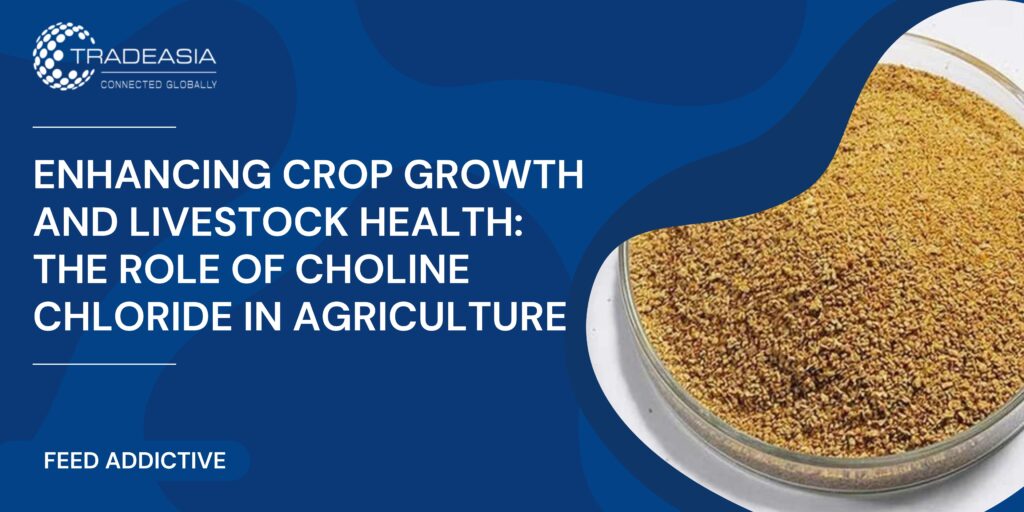
In an ever-changing agricultural landscape, the pursuit of higher crop yields and healthier livestock is a constant endeavor. Amid all this, choline chloride, a chemical compound often overshadowed by better-known nutrients, has gradually become an important factor in modern agriculture. This article delves into the central role of choline chloride in agriculture, exploring the applications, benefits, and science that make it an indispensable part of the industry.
Choline chloride: The Unsung Hero
Choline chloride is a quaternary ammonium salt, recognized as a member of the vitamin B complex. It plays an essential role in the metabolism of all cells alive and especially important for animal and plant health. It participates in various physiological processes, including cell structure, cell signaling, and fat metabolism.
Choline in animal nutrition
In the livestock industry, choline chloride is an essential ingredient in animal feed formulations. Here’s why it’s important:
- Enhanced Growth: Choline is important for the development of healthy, fast-growing animals. It facilitates fat metabolism, ensuring the animal uses food efficiently.
- Liver health: The liver is a powerful metabolic organ in animals. Choline prevents fatty liver syndrome, a common issue in livestock, by facilitating fat transport and metabolism.
- Reproduction: Choline is crucial for reproduction in animals, supporting healthy pregnancies and the development of young offspring.
- Stress Management: In times of stress, such as weaning or transportation, choline helps animals cope, reducing the risk of illness and weight loss.
Plant Applications
While often associated with animal nutrition, choline chloride has applications in plant agriculture as well. It acts as a growth promoter, enhancing the health and productivity of crops. When used as a foliar spray or soil conditioner, it can:
- Stimulate Plant Growth: Choline chloride has been shown to enhance the growth of various crops by promoting cell division and elongation.
- Boost Crop Yields:
Increased plant growth often translates to higher yields, which is a boon for farmers aiming to produce more with less. - Enhance Nutrient Uptake: Choline chloride can improve the plant’s ability to absorb nutrients from the soil, further supporting robust growth.
- Stress Resistance: Like in animals, choline helps plants manage environmental stress factors, such as drought or extreme temperatures.
Application Methods
Choline chloride can be applied in various ways:
- In Animal Feed: It is commonly included in animal feed formulations to ensure that livestock receive an adequate daily intake.
- For foliar spraying: For plants, choline chloride can be diluted and sprayed onto leaves or applied directly to the soil.
Choline chloride and sustainable agriculture
The use of choline chloride is consistent with the principles of sustainable agriculture. By ensuring the health and productivity of crops and livestock, it contributes to more efficient resource use and reduced environmental impact. It also supports the health of animals by promoting their growth and health.
Global impact
The importance of choline chloride in agriculture is global. It plays a role in meeting the nutritional needs of the growing global population while reducing resource waste and environmental damage.
Challenges and considerations
While choline chloride offers many benefits, it is essential to consider challenges and best practices:
- Proper dosage: Make sure it is correct Dosage is essential because excess Choline chloride can cause unwanted effects.
- Environmental impact: Managing the use of choline chloride is important to prevent environmental pollution.
- Specific applications: The use of choline chloride should be adapted to the specific needs of plants and animals.
Conclusion
Choline chloride, often overlooked in the field of nutrition, has quietly developed into an important component of modern agriculture. Its role in animal nutrition and plant growth highlights its versatility and importance in improving agricultural productivity, animal health and sustainable agricultural practices. As the world grapples with the challenge of feeding a growing population while minimizing its impact on the environment, choline chloride is emerging as an essential ally in the quest for healthy diets. better, healthier.
